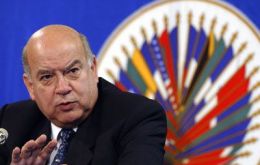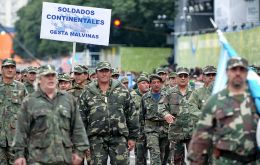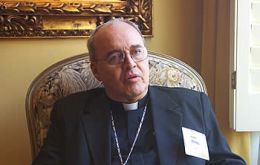MercoPress. South Atlantic News Agency
Politics
-
Tuesday, May 25th 2010 - 00:57 UTC
IMF bluntly tells Spain austerity and reform measures are not enough

The International Monetary Fund has raised fresh concerns about Spain's economy, saying “far-reaching” reforms are needed to ensure its recovery. It said the country faced “severe” challenges, including the need to urgently reform a “dysfunctional” labour market, and its banking sector.
-
Tuesday, May 25th 2010 - 00:52 UTC
Beckham on goodwill visit to UK and US troops in Afghanistan

English football star David Beckham this week visited Camp Bastion, the main British base in Afghanistan for a goodwill visit to meet British and US Armed Forces.
-
Tuesday, May 25th 2010 - 00:43 UTC
UK outlines start of massive cuts to “wasteful spending across the public sector”

Less than a fortnight after the Conservative-Liberal Democrat coalition took power in Britain, Chancellor of the Exchequer George Osborne outlined plans to cut £ 6.2 billion pounds (8.92 billion USD) from government spending to help reduce the budget deficit.
-
Monday, May 24th 2010 - 15:03 UTC
Brazil launches its public broadcasting service targeted to Africa

Brazil launches Monday its international Public Broadcasting Service with the initial purpose of penetrating the African continent, more precisely the former Lusitanian Empire where Portuguese is spoken.
-
Monday, May 24th 2010 - 05:51 UTC
Insulza takes oath as OAS Secretary General for second five-year period

The Organization of American States (OAS), Secretary General Jose Miguel Insulza will be sworn Monday for a second five year term. Chilean born Insulza will take the oath at a special meeting of the OAS Permanent Council in Washington DC.
-
Monday, May 24th 2010 - 05:43 UTC
Argentina’s May celebrations with multiple parades included Malvinas veterans

“Let the Bicentennial festivities begin” Argentine President Cristina Fernández de Kirchner announced on Friday and Argentina put its best military and musical display on Saturday in the build-up toward Tuesday’s 200th anniversary of the country’s nationhood Tuesday May 25.
-
Monday, May 24th 2010 - 03:52 UTC
Rousseff promises New York investors “continuity” of Lula da Silva’s policies

Brazil's ruling party presidential candidate Dilma Rousseff promised, if elected, continuity of current economic and financial policies to ensure growth and macro-economic stability. She also stated that Brazil was prepared for “a woman president”.
-
Monday, May 24th 2010 - 03:33 UTC
Morales tells Spanish companies their investments in Bolivia are protected

Investments by Spanish firms are protected in new Bolivian regulations, but companies involved in plots against the government will not be forgiven, said President Evo Morales on Sunday during a fence-mending speech.
-
Monday, May 24th 2010 - 03:23 UTC
Cuban Catholic Church mediation helping with liberation of political prisoners

Cuban dissident Guillermo Fariñas said on Sunday that the Catholic Church notified him that Raul Castro’s regime on Monday will begin taking “preliminary steps” regarding ill political prisoners and that a meeting is scheduled for this week “to speak about releases”.
-
Monday, May 24th 2010 - 03:14 UTC
German “Love Boat” catches fire in Norway: 607 passengers and crew evacuated

A cruise ship made famous by a German “Love Boat” TV show caught fire Sunday, forcing 607 people aboard to evacuate in a western Norwegian port, rescue officials said.
